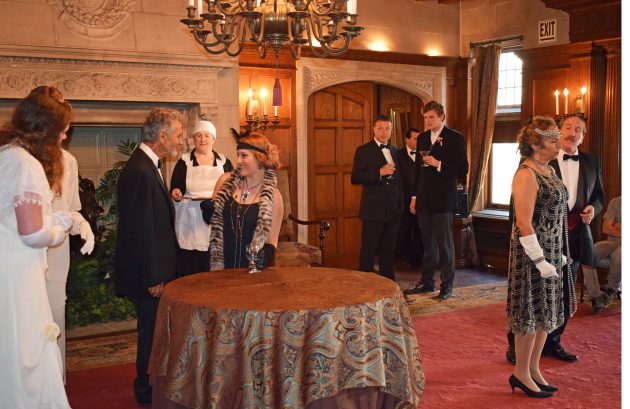
The Manor. On-site production at Greystone Hall, West Chester, PA through November 18, 2018.
This is a return of a production we recommended one year ago when it had its East Coast premiere:
For fifteen years a California theater company has presented the drama The Manor in the Greystone Mansion in Beverly Hills — an appropriate spot because the play is based on a true murder and suicide in that home.
Now the Colonial Playhouse, a community theater company in the town of Aldan in southeast Pennsylvania, is presenting The Manor‘s East Coast premiere. It’s playing in Greystone Hall, at the center of a thousand-acre country estate near the town of West Chester. Audience members are led from room to room in the mansion as the narrative unfolds.
This story is based on the real life of Edward Doheny, an oil tycoon in the 1920s. President Harding’s Secretary of the Interior Albert Fall received a bribe from Doheny and leased U.S. government petroleum reserves at Teapot Dome in Wyoming to Doheny’s company at a low rate. Fall went to jail for this, the first Cabinet official ever to go to prison.
Secretary Fall also was suspected of the 1896 murder of rival politician Albert Fountain and his eight-year-old son in New Mexico. This public official apparently was, to use Donald Trump’s words, virtually a man who “could shoot a man on Fifth Avenue and get away with it.”
Upton Sinclair’s 1927 novel Oil! (the inspiration for the 2007 film There Will Be Blood starring Daniel Day-Lewis) includes a character based on Doheny. The famed crime novelist Raymond Chandler included this murder-suicide in his The High Window. To avoid legal exposure, playwright Katherine Bates renamed the family “MacAlister” and she calls this “a fictionalized story inspired by true events.”
The estate is an important part of the drama, because it reveals the aura of privilege that led the characters to act above the law, with a sense of entitlement. This property was designed by architect Charles Keen, whose best known project other than Greystone is the Winston-Salem, North Carolina estate built for the R.J. Reynolds tobacco family. We reach the mansion after a mile-long drive through deep woods along a twisted gravel road. All of the rooms are elegantly furnished, so it seems appropriate when we find ourselves guests at the wedding reception for the tycoon’s son and his bride, where gifts are delivered from Charlie Chaplin and William Randolph Hearst.
A U. S. Senator (changed from the actual Secretary of the Interior) who solicits the bribe is well-played with brash ego by David Cashell. The wealthy owner of the estate is depicted gregariously by Stephen Kelly. He emerges here as a man reluctantly induced into a criminal enterprise. The real Doheny apparently was a more aggressive man, and more culpable, and this script makes MacAlister a bit too sympathetic.
The wives of those men are touchingly portrayed by Annaliese Gove and Marcia Hepps. A wonderfully poignant scene in the piano room reveals how they deal with their domineering husbands. The MacAlister son Sean is attractively played by the clean-cut Ryan Cassidy. Tom Karolyi convincingly interprets Sean’s friend Greg who accompanies the delivery of the bribe to Washington. That actor superbly depicts his anguish as he’s questioned by prosecutors, and his gradual descent into alcoholism. Kaitlin Healy sympathetically limns Sean’s innocent wife. Lawrence Geller is fine as the avuncular family lawyer.
Those in the audience who study history knew that a killing would occur but, still, we’re in suspense about how it will happen. There’s a buildup of tension, and mystery about the motive. In our era when rich deal-makers are in power, this drama is relevant. It’s gripping to watch how these wheeler-dealers handle themselves as investigators close in on them.
As directed by Sam Barrett, the action flows naturally from Great Hall to library to conservatory to bride’s dressing room. Because some of those rooms are small, the audience is divided into groups, and the actors must repeat scenes while other actors are simultaneously performing other scenes for other attendees a few rooms away. The logistics are awesome, and everyone interested in theater should see how it’s done. Enough chairs and couches are provided for audience members to sit while we follow the drama. Annaliese and Gaby Gove chose the elegant period costumes.
I hope we’ll be able to see repeats of this unique, outstanding production in the future.